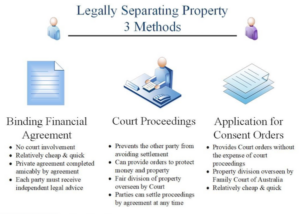Property Settlement – Rights and Entitlement
Understanding Property Settlement

- Entitlement to Property Settlement
- Time to Undertake Property Settlement
- The Division of Property Settlement
When it comes to your property and superannuation, it is never wise to make assumptions or to leave your property settlement to chance. The laws around property settlement are complex and legal advice from a property settlement lawyer, commonly known as a family lawyer, can ensure that you and your loved one’s interests are protected. Our lawyers are focused on the preservation of your family’s wealth, the avoidance of unnecessary costs and the conclusion of a property settlement that reflects what is fair according to the laws of Australia.

What are Family Law Property Settlement Rights?
Family law property settlement rights are rights that flow from the Family Law Act 1975 (Cth). These rights begin when certain conditions are met after parties in a relationship separate. Family law property settlement rights provide that property between the parties be divided fairly.
A family law property settlement does not happen automatically and having an experienced team of lawyers behind you can make all the difference. We know firsthand how challenging separation can be for you and your loved ones, especially where parties have differing opinions on their rights and entitlements. Despite these challenges, our lawyers work with you to negotiate fair terms of settlement wherever reasonable and possible given your instructions. Our lawyers are trained and committed to your welfare and to removing barriers preventing you from a fair property settlement. If you are separating, we are here to help you safeguard your future.
Property settlement if handled properly can provide you with peace of mind and security knowing that your interests were honoured and protected on fair terms. Unfortunately, not all property settlements are handled well and some settlements result in the destruction of family wealth and opportunity, which can affect your relationship with your loved ones. Our goal is to minimise the negative impacts that separation can have on the family unit. We use our experience and knowledge of the law to assist you with objective advice. We provide comprehensive advice on property brought into your relationship, property accumulated during the relationship, property accumulated after the relationship has ended and before your property settlement has been completed and superannuation (except in Western Australia where de facto property settlement cannot divide superannuation).
We know there are a lot of considerations to a property settlement, and that the decisions you make in your property settlement can affect your retirement and future generations. So, to help you make sense of this process, we provide a free 30-minute property settlement consultation with one of our property settlement lawyers. Call us today on 0485 872 417 to book a consultation.
Are you Entitled to Property Settlement?
While this question may seem straightforward, there are many considerations and exceptions to each party’s eligibility and proportion of their property settlement. Most people would not sign a contract without understanding what they are agreeing to, and your property settlement should be no different. So, make sure you know your rights and entitlements before you consider or agree to a property settlement.
General property settlement eligibility
If you answer yes, to any of the following questions, it is likely that you have the lawful right to undertake property settlement subject to any time limits (discussed below) that exist:
Marriages
Did either you or your spouse:
Provide any significant contributions including but not limited to financial contributions and/or caring contributions during the marriage?
Have children from the marriage together?
Have special needs or require financial support, for example, because you or your spouse are on a social security payment or pension?
How and when can I apply for Divorce?
Same-sex De Facto Relationships
- Were you in a same-sex de facto relationship for more than 2 years?
- Were you living together in a genuine relationship for more than 2 years?
- Did either you or your estranged partner:
- Provide any significant contributions including but not limited to financial contributions and/or caring contributions during the relationship?
- Have children together?
- Have special needs or require financial support, for example, because you or your de facto partner are on a social security payment or pension?
If you answered yes to any of the above questions, you are likely to have property settlement rights. In some cases, even if you answered no, you could still be eligible to undertake property settlement. For specific legal advice about your circumstances, speak to one of our property settlement lawyers today.
How Long do I have to Undertake Property Settlement?
Marriages
If you are married and separated (but not divorced), you can undertake property settlement at any time. Please note, if you have been separated for a long time your property settlement rights can be affected by the delay in the property settlement. In some cases, there may be no grounds for property settlement after a long period of time. If you have separated and not undertaken property settlement for a long period of time, call one of our property settlement lawyers today for a discussion about your property settlement rights.
If you are married and get a divorce, you have 12 months from the date of your divorce order to undertake a property settlement through a Court. If you are outside of the 12 month time limit, there may be exceptions that still allow you to complete property settlement through court action. Speak to one of our property settlement lawyers for an assessment on your eligibility to undertake property settlement.
De Facto Relationships, including Same-Sex De Facto Relationships
If you were in a de facto relationship, you have a two-year window to finalise your property settlement through Court action, from the date of separation. After the two-year period, there are limits and extra requirements that must be reviewed and met if you intend to give effect to your property settlement. Our property settlement lawyers can assess your rights and entitlements. We can also determine whether you are still eligible to undertake a property settlement through a Court action outside the two-year time limit.
How is the Property Settlement Worked Out?
The circumstances of each relationship are unique and require careful consideration of numerous factors. Only after these factors have been considered can a fair assessment of property settlement rights be made. That’s why it’s important to speak to one of our experienced property settlement lawyers for a full assessment of what would be a fair division of the property.

Some of the factors that go into working out a fair property settlement include:
- Property brought into the relationship by either party including:
- Cash, jewellery and inheritance etc.
- House, land, property, cars, shares etc.
- Businesses, trusts and property rights etc.
- Contributions made during the relationship whether directly or indirectly including:
- Income earned and or contributed during the relationship
- Employment income contributions by either party
- Contributions to the domestic duties or being a homemaker including cooking, cleaning and other household duties by either party
- Caring duties including:
- Caring for the children from the relationship
- Caring for the child or children of the other party where the children are from another relationship
- Caring for a family member, disabled child or disabled adult
- Caring for another person who required care including the other partner
- Contributions made after the relationship which can include:
- Property given or taken during the relationship or after separation
- Money given or taken during the relationship or after separation.
- Inheritance received by either party
- Contributions made by someone on a party’s behalf such as parents giving an interest-free loan or a gift of money toward a house
- Improvements made to property by either party
- Child support assessment(s)
- Child support contributions and contributions made for the children
- How the property settlement might affect the earning capacity of a party
- The age of each party
- The state of health and/or special needs of each party
- The physical and/or mental capacity of each party
- The income earning capacity of each party
- The employment circumstances of each party
- Whether a party has the care or control of a child from the relationship who is not 18 years of age
- The commitments of each party to support themselves
- Any responsibilities owed by a party to support any other person
The above is not an exhaustive list of the factors that can be considered in a property settlement. There are many factors that can affect a property settlement, which is why it is important to speak to one of our property settlement lawyers to ensure you are getting qualified legal advice. Our property settlement lawyers can tell you about the factors that will affect your property settlement, and how the factors are weighed to determine what is a fair property settlement.
Family Help Resources
Parenting rights after separation
Having trouble coping during a property settlement?
Property Settlement FAQs
How are Bank Accounts, Property and Assets Divided?
Informal Agreement
An informal agreement between you both. An informal agreement is not legal binding on you both and provides no legal protection. In some cases, your ex-partner could come back later for a larger slice of the property. We always recommend getting legal advice from a qualified family law lawyer for your peace of mind and protection.
Binding Financial Agreement
A Binding Financial Agreement is a private agreement between you and your ex-partner that must meet the requirements of the Family Law Act 1975. Each party must have independent legal advice.
Consent Orders
Consent Orders allow parties to get Court orders by agreement for the separation of property without having to actually go to Court. Consent orders must be fair and equitable in the circumstances. Our family law lawyers are experienced at obtaining consent orders successfully and ensuring that our client’s property rights are protected and that they receive their fair share of the property.
Going to Court
Court proceedings involve commencing family law proceedings and having a Court determine a fair and equitable division of property. The parties can agree to settle proceedings at any time by consent, approved by the Court.
What happens if one party doesn’t agree?
It is not uncommon for parties to have many disagreements at the outset of a property settlement. Our property settlement lawyers provide strategic negotiations to help bring about resolution of disagreements and help you move toward property settlement. If the parties do not agree, and Alternative Dispute Resolution avenues have been exhausted, then it is usually the right time to have one of our family law lawyers commence family law proceedings on your behalf.
Almost 95% of family law court cases are finalised without having to go through to a final trial. Even after a Court case has commenced there are interim hearings and stages long before the final trial. Our lawyers continue negotiations to bring about an agreed resolution to Court proceedings in which case the parties can jointly agree to end Court proceedings if the Court agrees.
A Court will consider many factors in making a determination and these are often unique to the facts of each relationship and the parties’ situation. The main factors the Court will consider are:
- The contributions the parties brought into the relationship
- The financial and non-financial contributions of the parties during the relationship
- The financial and non-financial contributions made by the parties after the relationship ended
- The future needs of each party
While family law can be complex, with straightforward legal advice we will help you separate your property and move forward with your life.
What is spousal maintenance?
Spousal maintenance is separate from child support, and can be a one-off payment or an ongoing regular payment made from one party to the other party for living expenses.
There is no automatic entitlement to spousal maintenance. Spousal maintenance must be obtained by an agreement between the parties or made by a Court order. A court will only make an order for spousal maintenance if the Court can be satisfied that:
- The party to provide spousal maintenance has the income capacity to allow them to meet their reasonable living expenses; and
- The party to receive spousal maintenance is in hardship or is in need of support.
What does ‘de facto relationship’ mean?
If you and your partner have a relationship and are living together on a genuine domestic basis, it is more than likely that you are in a de facto relationship. Usually, a de facto relationship commences when a couple in a relationship start living together, however, this is not always the case. A couple can be considered to be in a de facto relationship if they have separate residences.
If there is a dispute about whether a de facto relationship existed and the Court is asked to decide this point, the Court will consider various factors to determine the existence of a relationship, including:
- If there is a common residence;
- If a sexual relationship exists;
- If there are joint finances;
- If one party is financially supporting the other; and
- If the couple present themselves publicly as a de facto couple.
How are Bank Accounts, Property and Assets Divided in Same Sex Relationship?
In 2009 amendments were made to the Family Law Act 1975 which gave same sex couples access to the family court system. There are two ways assets (i.e. bank accounts, personal property and real property) and liabilities (i.e. mortgages and car loans) can be divided. First, you and your ex-partner could reach a mutual agreement. Alternatively, if an agreement cannot be reached, the assets and liabilities of the relationship can be divided by a determination of the Court.
Importantly, a division of the assets and liabilities is not simply a matter of an equal split. As a starting point, the asset and liability position of each party at the start of the relationship should be identified. Our experienced lawyers will ensure that this is carried our correctly. It is then important to consider all of the financial and non-financial contributions which were made during the course of the relationship and the future needs of each party in order to determine what is an equitable division.
Non-financial contributions include:
Being the primary caregiver for any children of the relationship; and/or
Being the primary house-keeper during the relationship.
Non-financial contributions can carry just as much weight as financial contributions. They should therefore be taken into consideration when determining the manner in which the asset pool is to be divided. If possible, attempt to reach an amicable solution with your ex-partner. If a fair and amicable solution is reached, then we can put in place a legally binding agreement to legally divide the property. Our solicitors will prepare a document known as a Binding Financial Agreement or Consent Orders which legally formalises the agreement reached so that any breaches of the agreed terms can be enforced in a Court of law if need be.
We can assist with gay and lesbian relationship issues and help you get a fair and equitable division of the property.
Contact Us for a Free Case Evaluation
If your ready to take the next step, lets chat about how we can help to get your life back on track. Call us at: 1800 572 122 to arrange an informal chat. We are here to help every step of the way. Please note that My Legal Crunch does not provide legal aid services.

